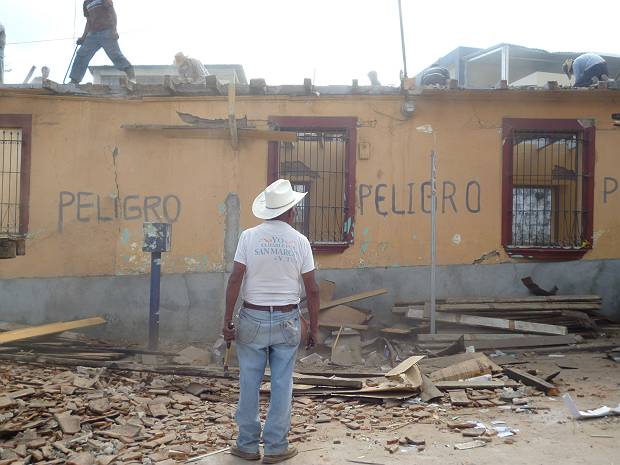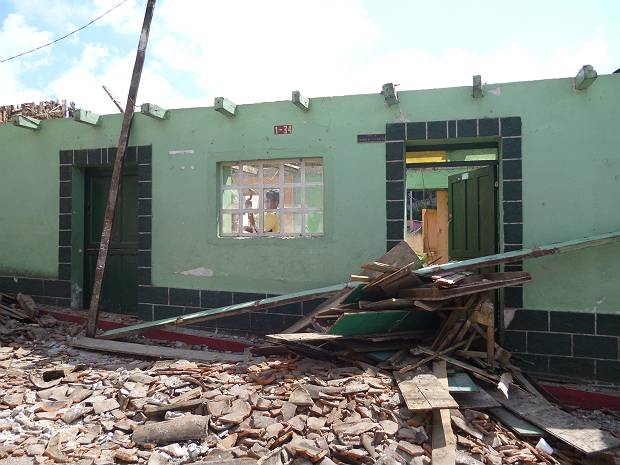
Activity Reports
Peace Boat support following Guatemala Earthquake
November 15, 2012
A severe earthquake of M 7.4 struck the western region of Guatemala on November 7, with the epicentre 43 km deep and 24 km from the town of Champerico on the west coast of the country. Great damage was caused throughout the region, including the loss of over 50 lives. Although more than a week has passed since the disaster, many citizens are still suffering greatly, with a total of 1.2 million people thought to be affected. Aftershocks are continuing, including a M 6.5 earthquake on November 11 which has exacerbated the damage. This is the biggest earthquake since the disaster in 1976 after which over 20,000 lives were lost.
A Peace Boat staff member travelled to Guatemala on November 12, 2012 to survey potential support for the relief efforts continuing in in San Pedro, San Marcos and surrounds. This visit and support is being conducted in coordination with the Guatemalan NGO CEIBA, a partner organisation of Peace Boat.

Some parts of the region are still greatly affected, with many citizens still forced to stay at shelters in a situation with the potential of further secondary damage. Emergency relief supplies have been provided in the main areas, but are yet to reach some suburbs. 8 of 22 prefectures of Guatemala have been affected, and thousands of people in need are now staying in the more than 60 evacuation centres which have been opened.
Peace Boat’s 77th Global Voyage visited Puerto Quetzal in Guatemala on October 25-26, just shortly before the accident. A guest educator and delegation of international students were onboard from Guatemala, and the exchange and learning which took place during their time onboard and as the ship was docked in Guatemala was a significant experience for all onboard. Now crossing the Pacific Ocean on the way back to Japan, staff and participants onboard have launched a fundraising campaign to support partners in Guatemala. Funds raised will be donated to the NGO CEIBA, to be used in their efforts to provide communities with materials such as cement and bricks for rebuilding vital local buildings such as schools and health clinics.
More information will be announced on this page as confirmed.

A severe earthquake of M 7.4 struck the western region of Guatemala on November 7, with the epicentre 43 km deep and 24 km from the town of Champerico on the west coast of the country. Great damage was caused throughout the region, including the loss of over 50 lives. Although more than a week has passed since the disaster, many citizens are still suffering greatly, with a total of 1.2 million people thought to be affected. Aftershocks are continuing, including a M 6.5 earthquake on November 11 which has exacerbated the damage. This is the biggest earthquake since the disaster in 1976 after which over 20,000 lives were lost.
A Peace Boat staff member travelled to Guatemala on November 12, 2012 to survey potential support for the relief efforts continuing in in San Pedro, San Marcos and surrounds. This visit and support is being conducted in coordination with the Guatemalan NGO CEIBA, a partner organisation of Peace Boat.
Some parts of the region are still greatly affected, with many citizens still forced to stay at shelters in a situation with the potential of further secondary damage. Emergency relief supplies have been provided in the main areas, but are yet to reach some suburbs. 8 of 22 prefectures of Guatemala have been affected, and thousands of people in need are now staying in the more than 60 evacuation centres which have been opened.
Peace Boat’s 77th Global Voyage visited Puerto Quetzal in Guatemala on October 25-26, just shortly before the accident. A guest educator and delegation of international students were onboard from Guatemala, and the exchange and learning which took place during their time onboard and as the ship was docked in Guatemala was a significant experience for all onboard. Now crossing the Pacific Ocean on the way back to Japan, staff and participants onboard have launched a fundraising campaign to support partners in Guatemala. Funds raised will be donated to the NGO CEIBA, to be used in their efforts to provide communities with materials such as cement and bricks for rebuilding vital local buildings such as schools and health clinics.
More information will be announced on this page as confirmed.



